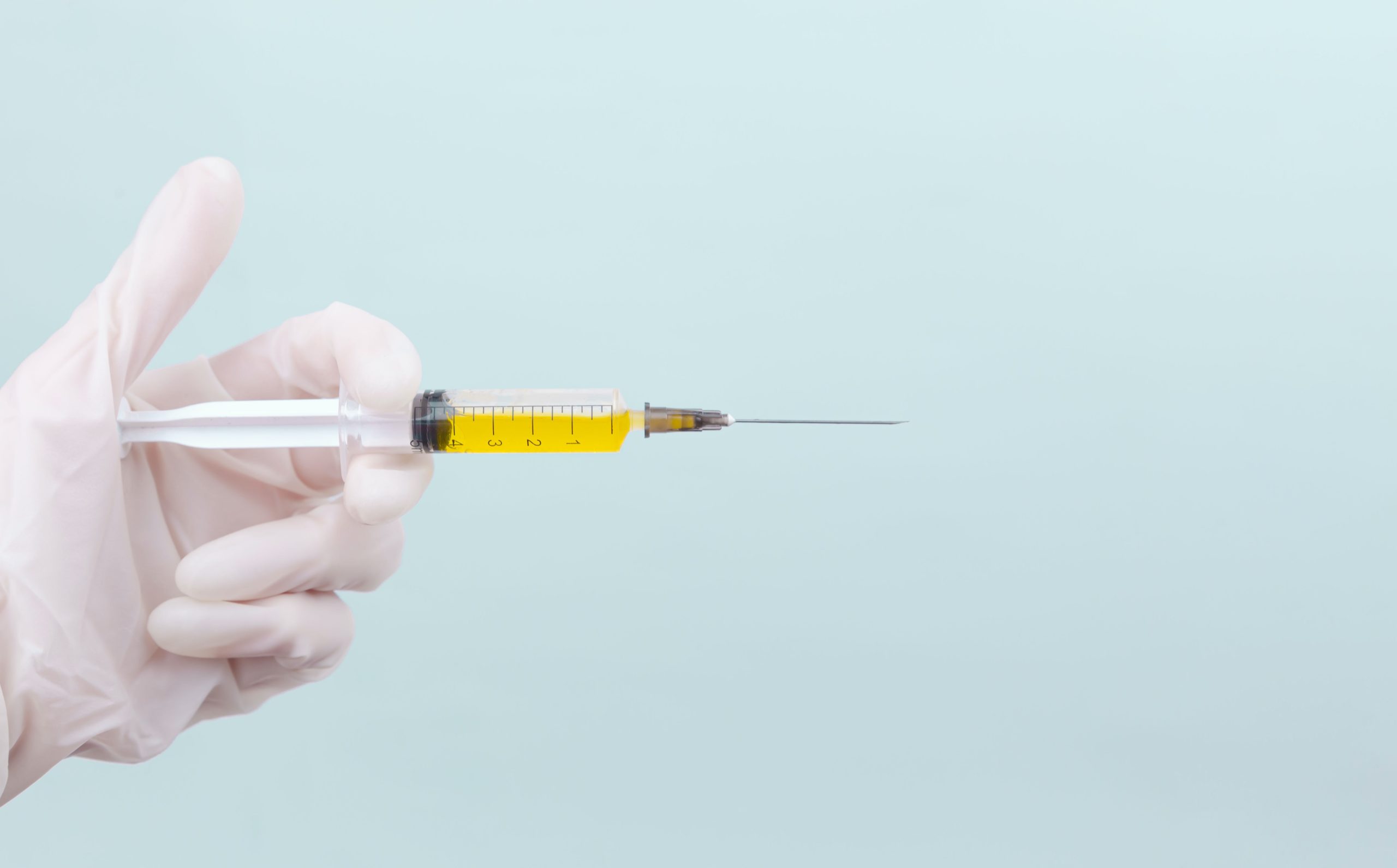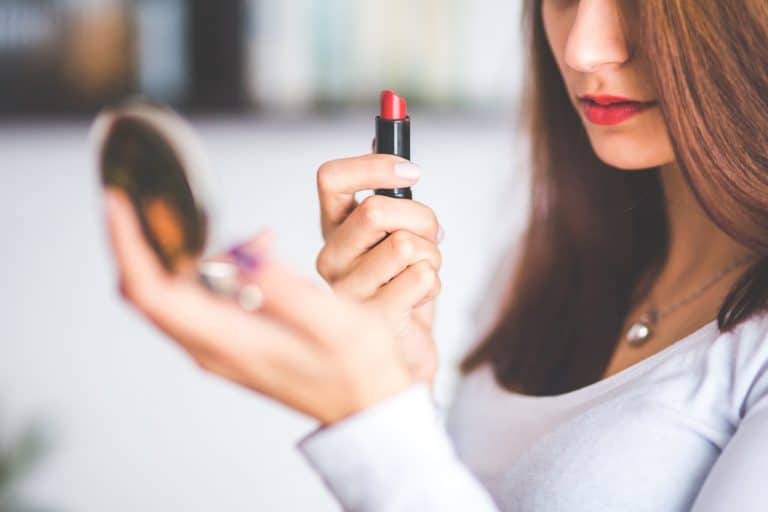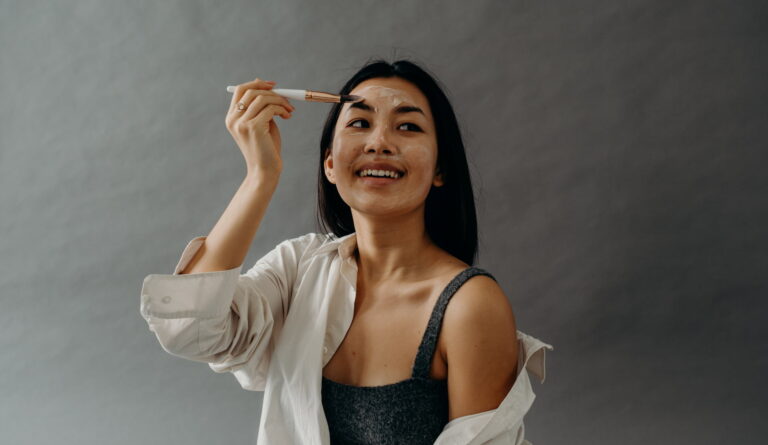In September 2021, Chinese state media called for stricter regulations on plastic surgery ads in China, mentioning its excessive pervasiveness and false claims.
In the last decade, China’s aesthetic medicine experienced a period of steady growth, driven by rising consumer disposable income, enhanced consumer awareness and the emergence of hedonic values. Chinese aesthetic medicine market jumped from 37.8 billion RMB in 2013 to roughly 198 billion RMB in 2020, boasting an astonishing 23.9% compound annual growth rate. Although the market started slowing down in 2017, its low penetration rate heralds that there is still room for future growth.
Married women between 25 and 35 years old, living in Tier-1 and Tier-2 cities, and boasting a high level of education are the main group willing to undergo plastic surgery. Moreover, aesthetic medicine tends to be more popular in southern cities than in northern ones. Skin therapies, facial plastic surgery and body contouring are Chinese clients’ most beloved aesthetic treatments; while double eyelids, nose augmentation, face slimming, upper eye lift and dark circles removal are the top 5 surgery tweaks in China.
As society evolves, men pay more and more attention to their look. Although women are more eager to undergo plastic surgery, nowadays increasingly more men opt for a nip-and-tuck. According to a report released by the aesthetic medicine app GengMei in 2018, male consumers accounted for 15% of users, indicating that men are imposing as an important driver of growth in such sector.
The jig is up: crackdown on plastic surgery ads in China
After years of repeated scandals, accidents, and the death of a mid-tier KOL after a liposuction in Hangzhou, in May the National Health Commission, along with other government departments, decided to take steps aimed at further regulating plastic surgery in China.
Thus, in August regulators banned consumer loans linked to cosmetic procedures from structured debt traded on the Shanghai and Shenzhen stock exchanges and prohibited financial institution from lending money to unlicensed plastic surgery clinics. Moreover, that same month, the State Administration for Market Regulation published some guidelines meant to constrain plastic surgery ads in China.
Then, in September 2021, the Chinese Communist Party-linked newspaper China’s People Daily strongly criticized the ubiquitous presence of medical beauty promotions both online and offline, urging for stricter regulations on plastic surgery ads. The first measure adopted by the National Radio and Television Administration consisted in deterring all television channels, radio stations and online platforms from broadcasting plastic surgery loans advertising. However, authorities will go on undertaking actions aimed at curbing the influence of a sector accused of promoting anxiety over people’s physical appearance.
The dark side of the plastic surgery market in China
The crackdown on plastic surgery ads in China did not come from the blue: irregularities and misconducts dominate China’s plastic surgery market, thus it was evident that there would have been a brutal clampdown sooner or later. According to iResearch, just 12% of the clinics operating on China’s aesthetic medicine market in 2020 performed legal and compliant activities, while the remaining 88% formed part of a sordid network of unaccredited institutions, unlicensed physicians, uncompliant venues and counterfeit or uncertified substances. Accidents on the black market are a commonplace: about 100,000 people became disabled or died due to wrongdoing in illegal beauty clinics in China every year.
Being vs. appearing on Chinese social media
On Chinese social media the concept of “beauty value” (颜值) is gaining ground. In today’s ultra-competitive society being attractive is an asset in itself. Indeed, different studies have shown that people physically appealing tend to earn more money than those with a below-average looking, the income gap between them could even reach 230,000 US dollars. Even though women are more susceptible to social appearance anxiety, according to South Korean research, the wage gap is wider among men.
That is one of the reasons why today increasingly more men decide to use nip-and-tuck. Thus, undergoing plastic surgery in China is not just about resembling to what one has dreamt of looking like, but it is also an economic investment. Therefore, it does not surprise that on most popular Chinese social media platforms, such as Weibo and Xiaohongshu, topics like #plasticsurgerybeforeandafter and #comparingplasticsurgerybeforeandafter receive hundred thousand views and thousands of interactions.
Nevertheless, a body positivity movement is gradually expanding on Chinese social networks, encouraging people to feel at ease with their own body and attempting to curb the spread of appearance anxiety.
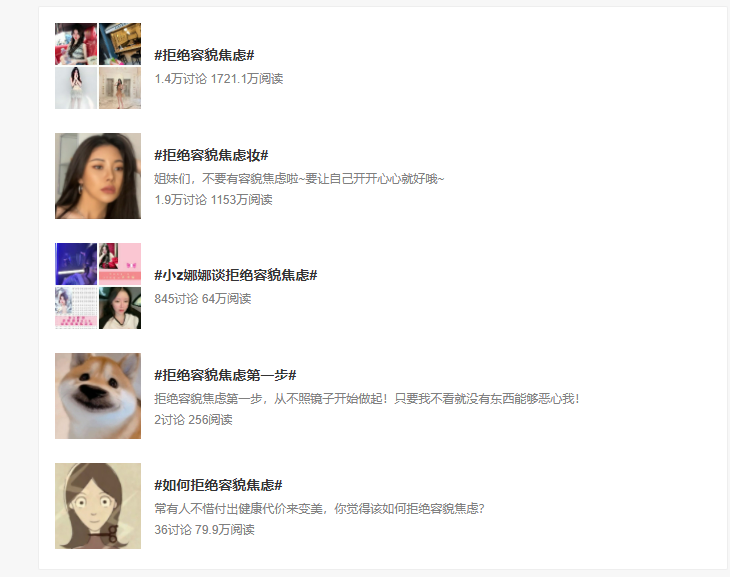
Yestar and Arsmo ads on Weibo, Wechat and Xiaohongshu
These companies are two of the most exclusive brands specialized in aesthetic medicine in China.
Yestar is a group with a headquarter in Hangzhou, focusing on providing aesthetic medical services. The company owns several clinics nationwide and it is especially renowned for its surgery and dermatology treatments. Yestar is particularly active on Xiaohongshu: its local official accounts are replete with posts showing before and after pics as well as advertising newly launched promotions. Its 2021 Golden Week campaign included several offers and discounts widely advertised on their Xiaohongshu, Weibo and WeChat accounts. Moreover, some of their surgeons proselytize the effectiveness of Yester treatments and give tips through their personal accounts.
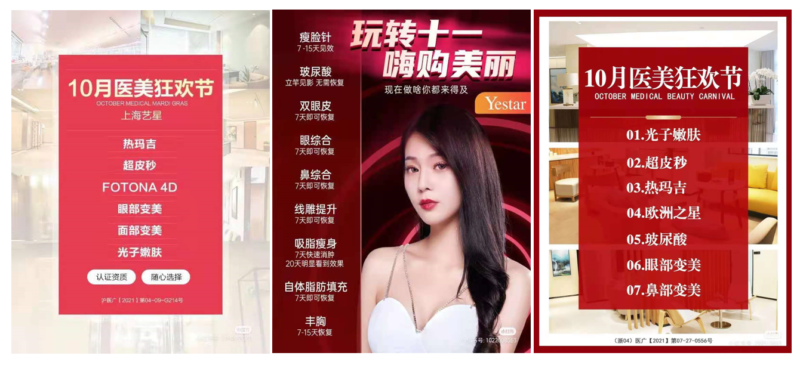
Arsmo is a Sino-Korean Joint Venture specialized in plastic surgery, cosmetic dermatology, and dentistry, running numerous hospitals across the country. Arsmo is much more active on Weibo, since it addresses to wider audience, such as men looking for hair transplantation. As it is a top aesthetic medicine brand advertising strategy, before and after pics cannot be missed on Arsmo Weibo pages. Moreover, the company runs a Q&A -structured blog on WeChat where potential clients can find relevant information about aesthetic treatments and why they should use them.
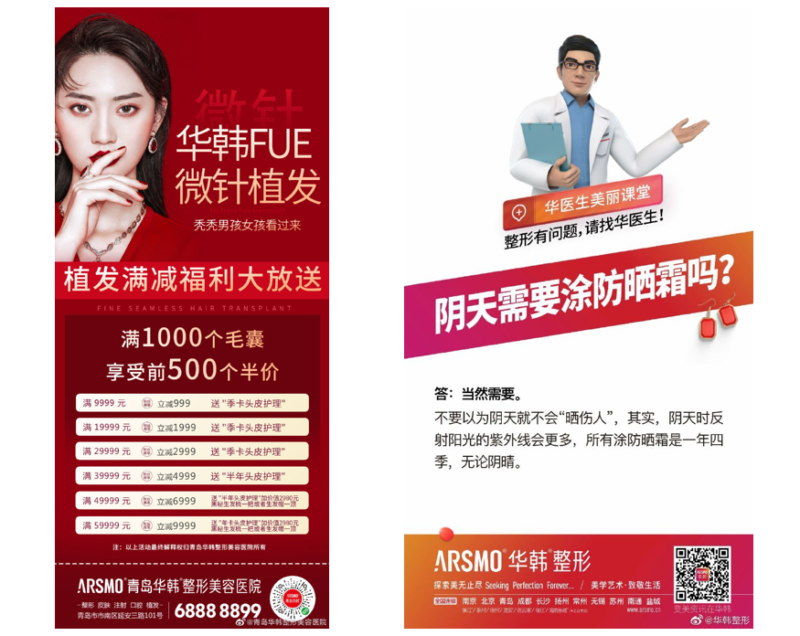
Making a point of government crackdown on plastic surgery ads in China
- Last month, state media called for further regulation of plastic surgery ads in China, as part of a wider crackdown on aesthetic surgery.
- Chinese plastic surgery market has thrived in recent years, and it is expected to hit 311 billion RMB in 2023; nevertheless, legal and compliant clinics account for merely 12% of medical institutions focusing on plastic surgery in China.
- The emergence of “beauty value” is inducing Chinese consumers to conceive aesthetic tweaks as an economic investment. Meanwhile, plastic surgery ads on Chinese social media platforms seem to provide the ultimate solution for achieving a more fulfilling and successful life.
Yestar and Arsmo are leading brands in China’s aesthetic medicine market, with several clinics in main Tier-1 and Tier-2 cities. Both companies utilize their Weibo, WeChat and Xiaohongshu accounts in order to publicize their treatments and spread the word about their promotions online. Their intensive advertising relies on before and after surgery pics, Q&A-structured commercials and the opinion of experts.


